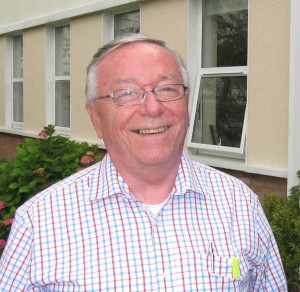 As reported in a recent newsletter Br Denis Claivaz has been appointed to the Congregational Leadership Team of the Presentation Brothers and will finish in Geneva and move to Toronto some time in the next few weeks.
As reported in a recent newsletter Br Denis Claivaz has been appointed to the Congregational Leadership Team of the Presentation Brothers and will finish in Geneva and move to Toronto some time in the next few weeks.
Here he reflects on his time with ERI.
The establishment of ERI in 2007 to engage in advocacy at the international level has been something new for the two founding Congregations. How has the experience of being part of ERI been for you?
The prophetic vision of both Congregation Leadership Teams in establishing ERI took a great deal of adjusting on my part. Add to that the fact that I had no experience of being part of something international and inter-congregational. However after three months I realized the potential of ERI and how we could effectively touch the lives of hundreds of thousands of marginalized persons whereas I had been accustomed to working with a few hundred.
Once I accepted this basic premise a whole new window of opportunity opened up for me, but there was so much to do just to physically establish our presence and learn how we could work within the UN system. Living in France and working in Switzerland also posed its own unique set of problems.
How has your own understanding of the work of ERI changed over the four years of your involvement?
The Leadership of both Congregations emphasized the need for ERI to form a viable faith-based community before venturing into the work of Human Rights. Initially I was anxious to get started on the immense task of liberating the downtrodden and bringing the message of justice and peace to the marginalized young people but it did not take long for me to realize the wisdom of our Leadership. Having a solid Community from which to anchor our beliefs and draw strength for the task ahead was essential before diving into the work.
In order to focus on the work at hand – the right to education particularly for marginalized youth and care for the earth – it was important to first raise awareness about the work of ERI so letting the ‘grassroots’ know of our existence and how our work could benefit them became paramount. Now we have people who are involved in advocacy, who can initiate concerns, forward them to us and together we can put their case before the relevant bodies within the United Nations.
How would you assess the effectiveness of the work of ERI to date?
For 200 years both Congregations epitomised what “great Christian Education” was all about. We set up and ran some of the best Catholic Schools you could imagine. Many are still there as legacies to our work. Now it was being asked of us to add a new dimension to our repertoire, advocacy. Let’s start asking the “why” questions.
• Why are there so many young people not being educated?
• Why is the gap between the rich and poor ever widening?
• Why is there more slavery now than there was during the “slave trade”?
• Why are millions dying of hunger?
• Why is the planet in such peril as we pay lackadaisical heed to her plight?
• Why – Why – Why
And it is not just asking these questions but to whom we direct them that has become important. And ERI has contributed to just that. Using the various mechanisms of the United Nations and in particular the Human Rights Council, ERI has opened up the possibility for our grassroots people to ask the policy makers of this world the tough “why?” questions. Our people on the ground are being empowered to stand up and passionately cry out – Why? Why? Why?
What do you think have been the most significant achievements of ERI over the past four years?
We have
– established an Edmund Rice Religious Community in continental Europe with a mandate to focus on rights for marginalized youth.
– familiarized ourselves with the workings of the United Nations and in particular the Human Rights Council in Geneva.
– sensitized a large portion of our grassroots network to the potential of ERI and brought the importance of advocacy as another response to the injustice we see in our world to the attention of the Edmund Rice Network
– provided workshops and training for many in different parts of our Congregations
– formed collaborative networks with a range of like-minded organisations, particularly in Geneva and New York.
What do you think are the major challenges that ERI faces into the future?
– to convince Congregational Leadership at all levels in both Congregations to the necessity of continuing their support of ERI with suitable personnel and resources.
– to maintain the continued financial viability of ERI
– to ensure that our priorities are always centered around those localities, communities and countries who would have no voice if it was not for us.
– to continue to educate the ERN and to involve them increasingly in our work
– to continue to ‘sell’ the potential of ERI to the Brothers of both Congregations.
Best wishes with your new assignment Br Denis and congratulations on all that has been achieved at ERI in Geneva to date.
Best of Luck with your new venture in Tornoto may Jesus and Edmund guide you in every thing you do.
Thanks for your great contribution to ERI. WE must continue our fight for injustice in our world today.